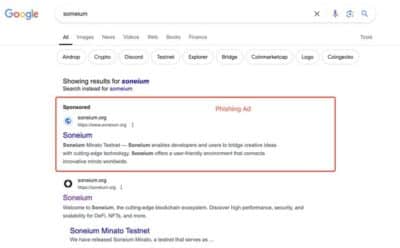A scam involving Sony’s new blockchain project, Soneium, has been uncovered by Scam Sniffer, a well-known Web3 anti-scam platform. The fraudulent campaign, which appeared through Google ads, led unsuspecting users to a malicious website designed to drain crypto wallets. The scam’s exposure highlights growing concerns about the safety of online ads, especially those related to the blockchain space.
Scam Sniffer revealed how a Google search for Soneium directed users to a phishing website closely resembling the official Soneium page. For all of its appearances of being a legitimate organization, the fake site was designed to pilfer connected wallets for cryptocurrency. According to the anti-scam platform, the scammers had managed to develop ways of beating Google on security measures, and as a result, the sites were screened in the usual way.

Source:@realScamSniffer
Also Read: Sony to Launch New Blockchain ‘Soneium’ on Ethereum’s Layer 2 Network
Fake Website Exploits Minor Typo in Domain Name
One of the key tactics used by the scammers was registering a domain name that was nearly identical to the official Soneium site. During the investigation, Scam Sniffer pointed out that even a slight misspelling made people type “someium” instead of “Soneium,” which led them to the fake site. This attention to detail and being able to make an almost clone of the original site made this scam possible.
While most Google ads usually point to verified or original websites, Scam Sniffer pointed out that phish scheming like this can find their way here. The security platform also urged users to be careful, especially while clicking blockchain advertisements. This case shows that even such reputable sources as Google can become a target for fraudsters’ activity.
Soneium itself released its testnet in August as an Ethereum Layer-2 blockchain. It was built with emerging optimistic roll-up technology and Optimism’s OP Stack to onboard new Web3 customers, including Sony Music. Nevertheless, scammers decided to use it as the core of their phishing campaign.
Conclusion
The rise in phishing scams targeting blockchain projects like Soneium underscores the need for heightened vigilance. Investors and users should carefully check URLs and remain skeptical of seemingly legitimate ads. Platforms like Scam Sniffer play a critical role in exposing such schemes, helping safeguard the digital asset ecosystem from further exploitation.
Also Read: Sony Acquires Amber Japan, Marking Entry into the Crypto Industry
